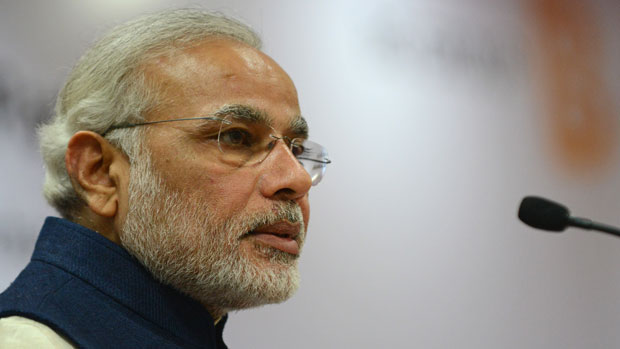Indian election: Narendra Modi’s BJP tipped for victory
Mammoth vote seen as ‘a contest for the soul of India’

A free daily email with the biggest news stories of the day – and the best features from TheWeek.com
You are now subscribed
Your newsletter sign-up was successful
Narendra Modi’s Bharatiya Janata Party (BJP) is expected to claim another term in office as the counting begins of more than 600 million votes cast in the country’s six-week election.
Most exit polls put Modi on track to form a government in coalition with smaller parties. However, analysts have warned that such polls have often been wrong in the past.
Early results from the count signalled that the BJP was within reach of an outright majority, thanks to strong gains in the southern state of Karnataka and only moderate losses in the Hindi heartland states of north India.
The Week
Escape your echo chamber. Get the facts behind the news, plus analysis from multiple perspectives.

Sign up for The Week's Free Newsletters
From our morning news briefing to a weekly Good News Newsletter, get the best of The Week delivered directly to your inbox.
From our morning news briefing to a weekly Good News Newsletter, get the best of The Week delivered directly to your inbox.
The Guardian describes the election as “a contest for the soul of India”, with the Hindu nationalist BJP facing off against Congress, whose secular vision has defined the country for most of the past 72 years.
The Times says the “cult of Modi” is set to give him another five years in power. It adds: “In the seven decades since independence, few leaders have captivated India so utterly as Mr Modi. He and the BJP, with its aggressive brand of Hindu nationalism, have changed Indian politics.”
The BBC paints Modi as a “polarising figure adored by many but also blamed for increasing divisions in India”, while Congress leader Rahul Gandhi “is trying to win over an India weary of his family's dynastic grip on politics”.
Milan Vaishnav, the director of the south Asia programme at the Carnegie Endowment for International Peace, says: “We are in an era where you have, once more, a central gravitational force around which Indian politics revolves.”
A free daily email with the biggest news stories of the day – and the best features from TheWeek.com
He concludes: “I think 2019 will confirm that the BJP has replaced the Congress as that.”
Rahul Verma, a fellow at the Delhi-based Centre for Policy Research, said: “There is no match for Modi among the opposition parties.”
The analyst added: “He’s running at nearly an all-time high popularity, he’s charismatic, and people still repose faith in him despite not being very happy with the economic side of the government’s performance.”
There has been growing concern over “the spread of violent Hindu nationalism” since Modi’s BJP came to power in 2014, notes CNN, which says the election has “left the country more divided than ever”.
The Indian election is run through a first-past-the-post system. To win, a party or a coalition needs to secure 272 seats out of 543 in the Lok Sabha, or lower house of parliament, to form a government.
-
 Will increasing tensions with Iran boil over into war?
Will increasing tensions with Iran boil over into war?Today’s Big Question President Donald Trump has recently been threatening the country
-
 Corruption: The spy sheikh and the president
Corruption: The spy sheikh and the presidentFeature Trump is at the center of another scandal
-
 Putin’s shadow war
Putin’s shadow warFeature The Kremlin is waging a campaign of sabotage and subversion against Ukraine’s allies in the West
-
 Epstein files topple law CEO, roil UK government
Epstein files topple law CEO, roil UK governmentSpeed Read Peter Mandelson, Britain’s former ambassador to the US, is caught up in the scandal
-
 Iran and US prepare to meet after skirmishes
Iran and US prepare to meet after skirmishesSpeed Read The incident comes amid heightened tensions in the Middle East
-
 EU and India clinch trade pact amid US tariff war
EU and India clinch trade pact amid US tariff warSpeed Read The agreement will slash tariffs on most goods over the next decade
-
 Israel retrieves final hostage’s body from Gaza
Israel retrieves final hostage’s body from GazaSpeed Read The 24-year-old police officer was killed during the initial Hamas attack
-
 China’s Xi targets top general in growing purge
China’s Xi targets top general in growing purgeSpeed Read Zhang Youxia is being investigated over ‘grave violations’ of the law
-
 Panama and Canada are negotiating over a crucial copper mine
Panama and Canada are negotiating over a crucial copper mineIn the Spotlight Panama is set to make a final decision on the mine this summer
-
 Why Greenland’s natural resources are nearly impossible to mine
Why Greenland’s natural resources are nearly impossible to mineThe Explainer The country’s natural landscape makes the task extremely difficult
-
 Iran cuts internet as protests escalate
Iran cuts internet as protests escalateSpeed Reada Government buildings across the country have been set on fire